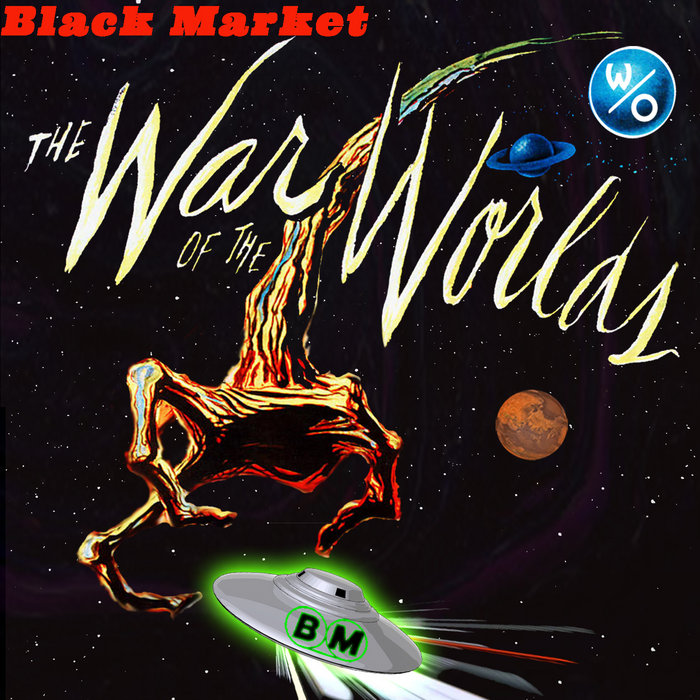
The War of the Worlds – Black Market
this blog is GROOVY – check out great Soul, Funk, Jazz, Hip Hop, Bass, Breaks , Reggae, House n many more TUNES
Hey there, cosmic travelers! Buckle up as we blast off into the far-out universe of sci-fi music. This genre is not just about space sounds and futuristic themes; it’s a wild mix of creativity, imagination, and some seriously funky vibes. So grab your space helmets and let’s explore how sci-fi took over the music galaxy!
It all started way back in the 1950s when science fiction began taking center stage in pop culture. Movies like The Day the Earth Stood Still and TV shows such as The Twilight Zone set the backdrop for a new soundscape. Musicians were itching to create tunes that echoed these strange new worlds.
One key player was composer Edgar Varèse, who was pioneering electronic music long before it became mainstream. By combining traditional instruments with early synthesizers, he created mind-bending compositions that felt like they were transported straight from another planet.
And then came Kraftwerk in the ’70s—these German lads really cranked up the synth game! Their album Autobahn didn’t just groove; it drove right into our hearts with robotic rhythms that made machines feel alive.
What would sci-fi be without its iconic soundtracks? Enter John Williams—the maestro behind epic scores like Star Wars and Close Encounters of the Third Kind. His orchestral wizardry fused classical elements with futuristic aspirations, making audiences feel every thrilling chase through space.
Let’s not forget about Ennio Morricone’s work on films like Blade Runner, whose haunting melodies enhanced those dystopian vibes perfectly. It’s almost as if these composers had their own time machines to transport us straight to alien worlds!
The ‘60s saw an explosion of rock bands embracing sci-fi themes. Think about David Bowie—his alter-ego Ziggy Stardust wasn’t just a character; he was a whole movement! Bowie’s glam-rock aesthetic mixed with extraterrestrial concepts cemented him as one of rock’s most innovative artists.
And then there are bands like Pink Floyd, whose albums such as The Dark Side of the Moon take listeners on a psychedelic journey through time and space—a perfect blend for those seeking an out-of-this-world experience while lounging on their bean bags!
Did you know that many musicians claim they’ve encountered aliens? For instance, guitarist Jimmy Page reportedly got inspiration from his obsession with Aleister Crowley (who talked to spirits), which led him down some trippy paths—even claiming his house was haunted by otherworldly entities!
Then zoom ahead into the late ‘70s when disco hit outer orbit! Bands like Kano combined shiny disco beats with science fiction themes creating tracks that made you want to dance under glowing stars—and sometimes even wear silver jumpsuits at your local club!
This era brought us hits like “I Love You Baby (L.O.V.E.)” by L.A.X., filled with groovy bass lines that felt tailor-made for intergalactic dancing! Who doesn’t love bop-bopping along while pretending they’re floating through zero gravity?
But hold onto your glitter balls—did you know some disco musicians had strict rules? For example, famed producer Giorgio Moroder, known for his groundbreaking work on “I Feel Love,” imposed tight timelines during recording sessions. If any musician missed deadlines or flubbed notes too many times… well, let’s just say a pink slip might have flown across intergalactic airwaves!
Fast forward to the ‘80s where synthesizers ruled pop charts! Enter bands like Depeche Mode and Duran Duran—their catchy melodies wrapped around sci-fi narratives hooked countless fans worldwide.
With hits like “Planet Earth,” Duran Duran took us sailing through dreamy landscapes painted in vibrant hues while combining fun beats reminiscent of swirling galaxies.
Speaking of style—in this era, musicians often sported what can only be described as “futuristic meets thrift store chic.” Picture huge shoulder pads intersecting fluorescent colors matched perfectly by spiky hairstyles. It’s hard not to giggle thinking these trends were seen as “high fashion” back then!
Jumping onboard today’s spacecraft brings us artists who continue exploring deep-space sounds—from Björk’s avant-garde performances inspired by nature’s alien-like qualities to Janelle Monáe’s Afrofuturistic grooves paving paths towards social commentary within sci-fi realms.
In fact,—get ready for this one—her album covers often depict her battling robot overlords or frolicking among played-up futuristic cityscapes—a testament showing how relevant issues weave seamlessly into fabulous musical storytelling!
So whether you’re vibing out at home listening under twinkling lights or tearing up dance floors dressed sparkly costume attire—it doesn’t matter because sci-fi music keeps evolving beyond limits we once thought possible! And let me remind you…
There’s nothing quite so delightful than finding funny quirks shared alongside artistic genius throughout history—like mythical aliens appearing every now-and-then helping jam sessions happen faster than light speed itself😉🚀✨ ! Happy listening!

The War of the Worlds – Black Market